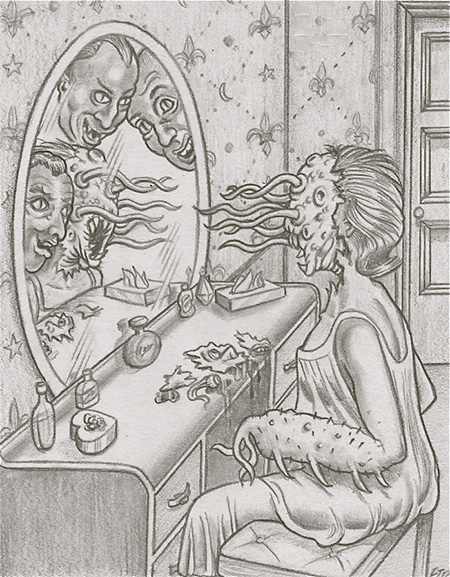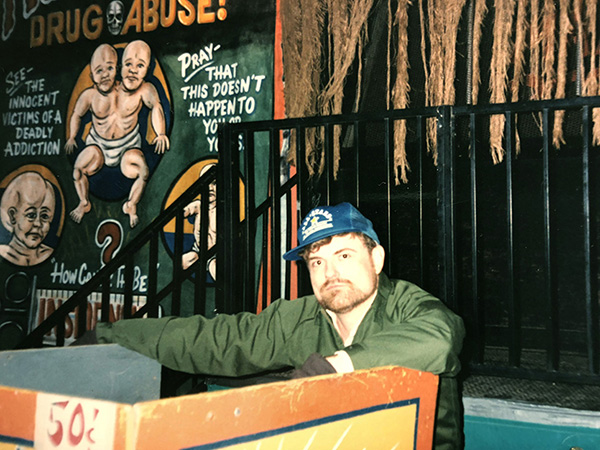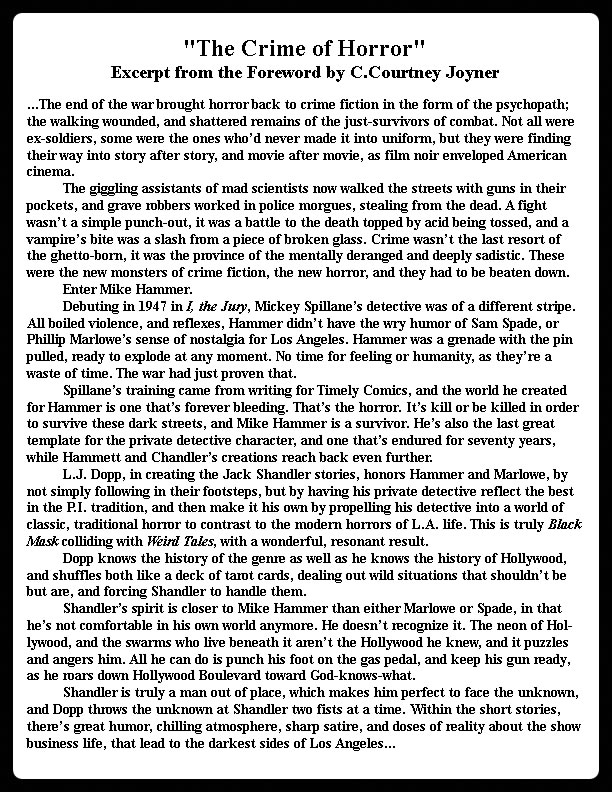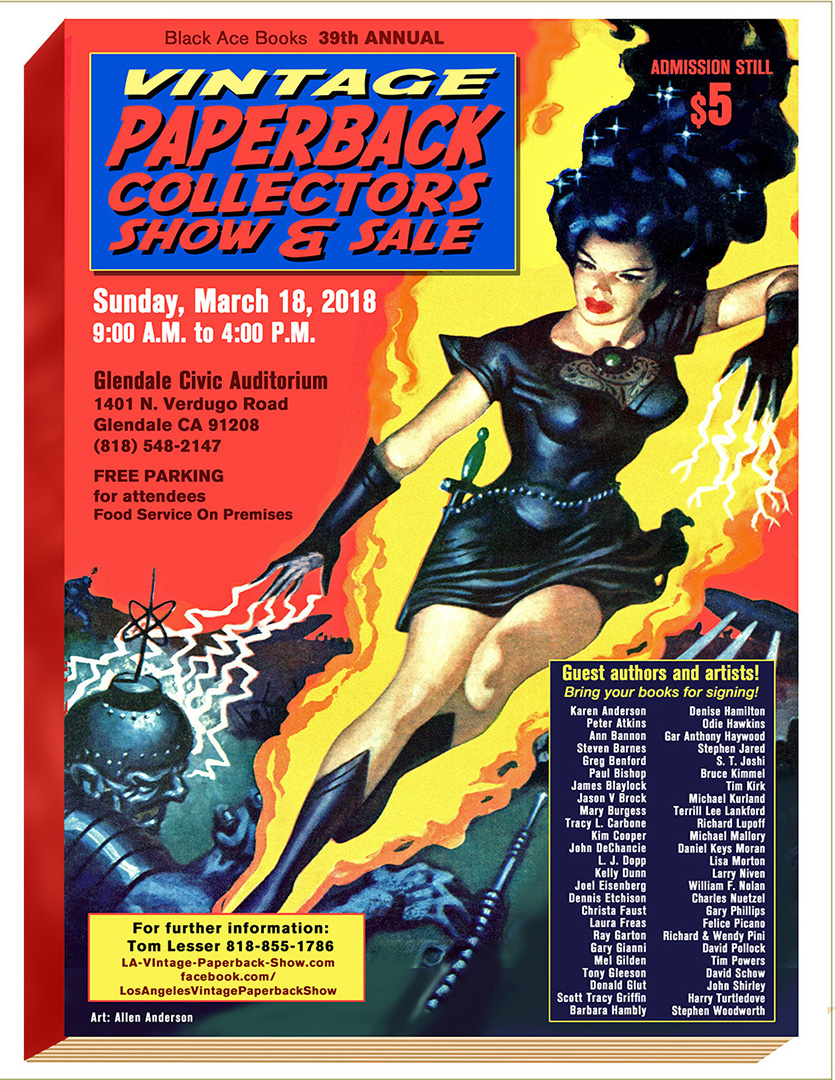
Cthulhu Noir:
The Naming of Names
An Afterword by
Brad Linaweaver
to
The Wakefield Horror
by L. J. Dopp
Neon Pulpworks, 2018
$19.95, ISBN 978-1-387-60714-3
Cover Art and All
Illustrations © L.J. Dopp 2018
A new book by L.J. Dopp is cause for celebration. That doesn’t mean we should light the candles for a Black Mass. Nothing that traditional would be appropriate. This is a friendly celebration, even though elder gods and monsters are on the guest list.
The author of last year's The Brain That Couldn't Think is a writer, illustrator, and musician who always thinks. He is a permanent resident of what Forry Ackerman referred to as Hollyweird, Karloffornia. From that vantage point (perhaps at Griffith Observatory?) he explores all of space and time—but is just as likely to find a mystic rune reflected in a puddle of dirty water, next to a window display of arcane texts in a dilapidated bookstore.
A black cat can look at a king. A nickel-and-dime private eye can look into glowing yellow eyes with double pupils and swirling irises, meet stare for stare, and not go blind. Heroes are too pissed off to care about something as unimportant as their own sanity.
The Wakefield Horror is the new collection of six short stories and the title novella, detailing the adventures of Jack Shandler. Although content with solving routine crimes on the earthly plane in the stories (often involving "the arcane and the occult"), he finds himself in the universe of The Cthulhu Mythos in the novella. Perhaps it is more accurate to say the tip of H. P. Lovecraft’s arctic imagination intrudes into Shandler’s world of cops and criminals, making skid row look like an ideal vacation spot by comparison.
In his contact with the infinite, Shandler books reasonable trips. Although not visiting the frozen wastes of Yuggoth, he does take a trip to Boston. The infinite is where you find it, plus expenses.
Dopp draws a vivid contrast between the daily strife of a private detective and when Lurkers finally cross thresholds. For example, Shandler automatically notes the ages of other humans: twenty-something males, thirty-something women, teenage girls, and so forth. Meanwhile, the Great Old Ones measure time in eons, with no interest in the petty concerns of the sub-species known as the human race. These are different world views, to put it mildly.
Dopp includes a couple of spoofs among the stories, but The Wakefield Horror novella is deadly serious, other than for Shandler's habitual wisecracking. The author's approach to Cthulhu Noir is not in the school of the films, Cast a Deadly Spell or Witch Hunt. Nor is he taking the dispassionate approach of Alan Moore’s graphic novel, Neonomicon. Jack Shandler has found his own seedy niche.
Dopp is fond of his hero. It’s contagious. The readers will like him, too. We don’t only believe in Jack because we know the vintage cars he drives, or that he relies on a Glock 19 named "Trigger" to take care of business. Shandler is in a yin/yang struggle with the clichés of hard boiled crime fiction, even more restrictive than the rituals of the macabre.
Consider this. Dracula doesn’t drink . . . wine. Well, this detective doesn’t drink . . . booze. But we’re not done. The detective doesn’t drink . . . coffee!!!
A gumshoe who doesn’t drink coffee? The mind reels. Now we know anything can happen in these stories.
Dopp is witty without undercutting the feeling of dread. He is literary without forgetting to tell a story. Given his background as a painter, his visual imagination is second to none; but he is also attuned to the sound of terror as a musician. When Shandler hears discordant piping, we also hear it in our mind’s ear.
Properly done, the horror story is a magic trick where it also helps to be a juggler. The hardest part is balancing the intellectual with the visceral. Dopp combines angry action with the Lovecraftian paranoia of eternal nightmare. The best moments of these stories have a quality of Robert E. Howard when the great Texan placed his stubborn heroes in the HPL universe.
Even more fun is when Shandler suddenly comes off as an amateur academic. Writers should always think about the power of certain words and the naming of names.
Lovecraft built his pantheon over many years, inviting other writers to participate. He started out with a sea god who was worshiped by the ancient Philistines, and later the Phoenicians. Dagon was a perfect name for such a monster.
But then Lovecraft made a fateful decision. A student of the ancient world, he brought his linguistic skills to the blood stained altar of his deep imagination. He gave us new gods that also had something to do with very old beliefs.
Jack Shandler has an opinion on this. Sometime between lonely stakeouts and dodging bullets, he studied ancient Sumer and Babylon. It could happen. He notes parallels in the Mythos to certain pagan deities as possible influences for Lovecraft’s creatures. But here’s the amusing part. Shandler lives in a world where the Cthulhu Mythos is actual reality. Therefore, Lovecraft didn’t invent anything. He discovered the hidden truth, of course.
(As for our world, part of Lovecraft’s genius was to imagine a race of Super Aliens that would have been considered to be gods. He did that before it was cool, and pushed the envelope to the place where science fiction, fantasy and horror fused into a cosmology that attracts new writers forever. By finding fragments of names in the past that seemed to foreshadow what he made up, he followed the pattern of how new religions are born from old religions. But he was a materialist atheist doing this for stories about monsters. Best idea ever!)
Before the social interactions of modern fandom, the writers in Lovecraft’s circle were doing an earlier version of world building. Robert E. Howard, Robert Bloch, Clark Ashton Smith and many others added their diabolical tomes to the library begun by the Necronomicon. Now it’s L.J. Dopp’s turn. He offers the Grimorium Verum, an actual grimoire from the middle ages, but he includes the fictional, “Codex Batrachia.”
 A Wakefield horror.
However, there is something even more worthy of the original Lovecraft circle in this book. One of the stories is “The Ishtar Gate.” In our reality, in the year 1933, Lovecraft was invited to a dinner with A. Merritt at the Players’ Club in New York City. The two masters of fantastic fiction were taken with each other’s work. One of Merritt’s classics is The Ship of Ishtar (which ironically featured the same dark Babylonian deity as the "Wakefield" novella). Shandler has a most appropriate case among his adventures.
There’s a lot going on in this collection. In the end, L.J. Dopp brings something unique to the table. He gives us characters like Denise DeFlowered and Madame Zeitgeist. Jack comes up with lines like, “I rarely mix business with business.” A carney is most explicit that Hollywood is in no position to pass judgement on ten-in-ones or blow-offs. Only Jack Shandler would be threatened with, “I’ll kill you, and everybody who looks like you.”
Dopp bases one story on a true crime horror show, where local news is scarier than any fiction. Another story, an homage to Hitchcock, introduces a sexy space gal who hunts vampires," Same book. Same hero.
Whoever or whatever reads these pages, there is something waiting in the text; something we all need to know.
Finally, only Jack Shandler ever got a line like this:
“On he drove, faster still, into the yawning, slobbering night.”
The Wakefield Horror is available at this LINK.
 Brad Linaweaver is an award winning writer of short stories and novels, who has also been involved with film. He and his late friend, Chuck Hammill, are executive producers on L. J. Dopp’s Crustacean. Brad once worked a freak show for Fred Olen Ray at the El Monte Carnival. Part of his pitch was: “They started out to be twins, but something went wrong—terribly wrong.” Brad Linaweaver is an award winning writer of short stories and novels, who has also been involved with film. He and his late friend, Chuck Hammill, are executive producers on L. J. Dopp’s Crustacean. Brad once worked a freak show for Fred Olen Ray at the El Monte Carnival. Part of his pitch was: “They started out to be twins, but something went wrong—terribly wrong.”
 Mr. Dopp (pictured above) will be premiering his new book at the venue noted below:
Mr. Dopp (pictured above) will be premiering his new book at the venue noted below:
| 









